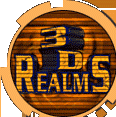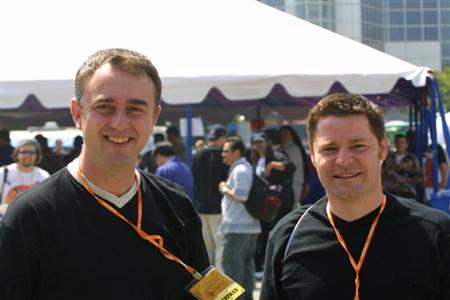The Apogee Legacy #13 - Andy Edwardson
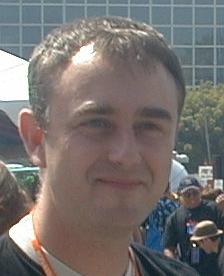 Today our "Apogee Legacy" Interview series continues on with an interview with Andy Edwardson. Andy did one title with us, a racing game back in 1994, called "Wacky Wheels". This game continues to have quite a following to this day, and was one that has been remembered quite fondly.
Today our "Apogee Legacy" Interview series continues on with an interview with Andy Edwardson. Andy did one title with us, a racing game back in 1994, called "Wacky Wheels". This game continues to have quite a following to this day, and was one that has been remembered quite fondly.
Andy was one of our overseas developers, he's from the UK, and back in 1994, it meant getting builds was a little more adventersome (and slow) than it is today in the land of the Internet and broadband connections. Wacky Wheels was also one of the first games to include a "Dopefish Cameo", something that has become somewhat accepted when a game is made by someone who was involved from back in the the day. :)
Andy is no longer in the game industry, but once he was tracked down, he was quite happy to contribute to our series.
Past Pioneers of the Shareware Revolution
Issue #13 - Andy Edwardson








1) How did you first come in contact with Apogee?
It is a bit hazy but I guess it was about 1992/93. Scott Miller contacted my partner Shaun Gadalla, who did the graphics for Wacky Wheels , and expressed an interest in taking the game on.
2) Was there a reason you decided to work with Apogee, say versus going on your own or working with another company?
In our opinion Apogee was the top shareware company and the commerical outfits did not think that arcade games on the PC had any future. Wolf really showed that anything was possible. Plus Scott is a great sales guy as well ;)
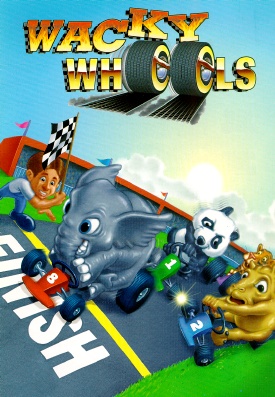
|
| Wacky Wheels Manual Artwork |
3) Looking back, was there anything Apogee could have done better, regarding the marketing and distribution of your game?
Well I doubt it had anything to do with Apogee but the really annoying thing for me was that I wanted to see our game in regular stores. I used to get really mad when I saw other titles in the shops but never ours. Apparently Formgen had plans to make it retail but it never seemed to happen.
4) Do you think your game was made better or worse by working with Apogee?
Better.
5) Apogee had a policy of letting the designer or studio retain full intellectual property rights to their game. Nowadays, it's rare to find a publisher who allows this, especially if the publisher is providing the funding. Do you believe that it's best for the creator to retain IP rights? Why or why not?
Not sure if IP meant much back then to us. My gut feeling though is that the creator should retain the rights to the IP but then again I find it hard not to be on the fence on this subject. Surely it all depends how much the publisher has invested in it as well.
5a) And if applicable, have you benefited from retaining ownership of your own IP?
I guess we own the IP but I cannot think of any real benefit.
5b) Do you think there'll ever be a sequel to your game(s)?
I doubt it. There has been a few times I thought about it but not as much these days.
6) Is there any story/incident that stands out as interesting during your time associated with Apogee?
Seeing a framed cover of our game in your offices in Garland next to all the classics you had brought out. That was a cool moment. Oh and going to George's house and meeting his Shark. Originally the Shark in Wacky Wheels was called "Bubbles". George told me that it was a bit of a sissy name for a Shark. I renamed him to Razer because of that.
7) Apogee was an early pioneer in terms of teaming up with external designers and studios, and continues to do so even to this day (currently working with Human Head Studios on Prey). Why is it that so few other studios do this (mentor and fund outside projects with lesser known teams)?
My perception has always been that Apogee/3d Realms are a kind of mini publisher/developer hybrid. I am not so sure that other studios would feel as comfortable doing this. Like you say, you have been doing this forever, and it works for you.
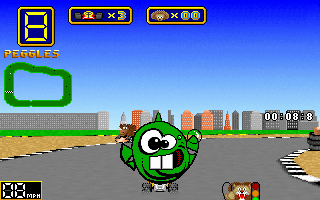
|
| Wacky Wheels Screenshot with Dopefish Cameo |
8) What the biggest difference in the industry nowadays versus when you worked with Apogee?
The sense of adventure back then was really great. It was a magic time. The industry seems much more formulaic today and kind of sterile in a lot of ways.
9) What have you been doing since your time with Apogee?
Well it's been over ten years now and a lot of stuff has happened. As far as my professional life goes I have been writig lots of software and hoping for that magic to return again :)
10) If you're no longer making games, have you thought about returning to this industry? If not, why not?
I do not make games anymore but I design and architect software for education. I find that my old games experience comes in handy. As far as returning to the industry , I doubt anybody would have me!!!
11) Looking back, are there any missed opportunities that you wish you'd have jumped on?
I wish we had joined Apogee earlier on. A little known fact is that we had a game cancelled by Apogee. It does not appear in the FAQ but it was called Prime Time Warrior. Anyway shortly aftert that we where asked to come over and work for you guys. I kind of regret not doing that.
12) Other than your game(s), what's your favorite game released or produced by Apogee (or 3D Realms)?
Monster Bash. I loved that game to bits.
12a) And what's your favorite 2-4 games released by anyone else?
Doom & Pac-Man.
13) Is there anything else you'd like to add about your time here or to fans of your title(s)?
Remember Kids Wacky Wheels is only a simulation. Don't drive like that in real life.
Thanks again to Andy for agreeing to contribute. Wacky Wheels was one of the more fun games in development for me personally in my time here at Apogee. There is more to the Wacky Wheels Story as well. A few years back Andy wrote some text about Wacky Wheels' development for the Apogee FAQ. I'm going to include that text here as well, but before you read that, check out these Wacky Wheels links:
Andy Edwardson's History of Wacky Wheels (as it appears in the Apogee FAQ):
Back in 1993, we were doing some low budget stuff for a Belgium outfit called Copysoft. I got fed up with the meager work, so I decided to work on a game engine in my spare time. I figured that the PC could do the mode7 stuff that the Super Nintendo was doing. I could not find any references for it, so I just studied Mario Kart and tried to figure out how it worked. I had a prototype engine up in about a week that did the floor painting and the rotation stuff. After that, I worked on it for a few more months, and Shaun Gadalla did artwork for it, and it started to get pretty solid. I showed it to the Copysoft crew, and they were quite excited and put a few screenshots of it on Compuserve. The problem was, we hadn't come to any commercial agreement with the company, and it was not a sure thing that they would get the game. Scott Miller, Apogee's president, happened to come across the screenshots and contacted Copysoft, and then we got into a fight with Copysoft over royalties, should Apogee end up distributing the game. I had made an unfortunate mistake -- I had included the C++ source code on the demo disk we left with them.
Shaun contacted Scott, and we came to an agreement. Shaun and I agreed to pay back what CopySoft had given us for equipment and so forth.
Development went on. When we went into beta we thought we would be out of there in a few weeks. However, when we got in there it was apparent that we needed more features. Beta was really important for me. If I had not listened to those testers, the game would not have been what it is. Most of the ideas came from us, but they kept the pressure up. It would have been too easy to sit on our hands and think what we were doing was best. The testers kept me on my toes, and, best of all, they told the truth. Another thing was Joe Siegler. I hate to admit this, but I didn't understand why he was so blunt all the time. I was so wrapped up in myself and becoming a bit of a pre-madonna. It was only later that I realized Joe was just being honest with us and trying to help us make the best game possible. I think Joe symbolizes what Apogee is; he works so hard all the time, and he practically lives there. At any rate, at one point I wanted to make amends with him. I knew he was into Dopefish, so I asked if we could put the fish in as a cameo. We discussed how it might work, and he sent me some stills and a collection of belches that he had recorded when he sat down one night with a microphone and a two liter bottle of Diet Coke. I picked one of them, but I think that Joe would have preferred it if I had picked one of the louder ones he sent me!
Because Doom had introduced the concept of modem play, the beta testers wanted it. Despite popular belief, Rise of the Triad did not introduce Remote Ridicule -- Wacky Wheels had it first. Rise of the Triad did take it one step further by allowing you to type messages to each other. At any rate, modem play really made my head spin. I never realised how unreliable packets were until I did the multiplayer engine. My hat goes off to John Carmack for his net play engine. To make matters worse, I was working at Shaun's place, and his phone lines were awful. But it did make the protocol really robust!
The music in Wacky Wheels was really lacking, and George Broussard said we needed more tunes. Jim Dose had just been hired at Apogee, and he had a terrific sound engine. We ripped out the old one and put his in. Jim also put us in touch with Mark Klem, and I would spend hours on the phone with him listening to his music. I really love the stuff he did, and I really should contact him for old time's sake.
As testing went on, I got more and more worried that, in the wake of Doom, all gameplayers wanted now was blood and guts, and Wacky Wheels wasn't about that. But we kept going, and I was determined to make it work. Anything the beta testers wanted, they got, except for the rear view mirror suggestion they kept plugging for. I didn't think it lent anything to the game, and it would have meant rendering another 3D view in another little window.
One memorable moment for us was when Shaun and I flew over to Texas, and we went to see George and Scott at the Apogee offices. I will never forget going into and seeing the pictures on the wall. They had the cover art for each of their games in a frame. Wacky Wheels was next to Wolfenstein 3D. That was an incredible moment in my life -- to be anywhere near associated with one of the greatest games of all time was neat to say the least. We went out to dinner with George and Scott, then visited their houses. (George had this bloody great big shark in a tank!) We got to talking about games, and George showed us Pitfall and asked if we could do anything like that. After Wacky Wheels, we did a test engine for them, but they were moving into the 3D market by then, and we didn't have anything to offer in that area at the time.
Anyway, we finally cracked the modem play, and it had one final round in beta testing. Joe Siegler gave it a good test, and he was happy with it. So it was finally ready to ship.
Then the bombshell hit us. Scott faxed us that Skunny Kart, a game from Copysoft that used my engine, had hit Compuserve. My heart sank. The only saving grace was that it was not all that similar to Wacky Wheels, and there was quite a legal wrangle over it all.
I was so angry, and it took all of Shaun's resolve to stop me from acting rashly. There was no way Copysoft had the ability to write an engine like that from scratch. In a perverse way, it taught me a valuable lesson. I was very hurt by it all, and it still bothers me to this day. In hindsight we were very stupid and should have known better.
If I could turn the clock back and make Wacky Wheels violent, full of blood and gore would I? Nah. It was fun, and kids big and small can enjoy it.
Make sure and tune in again next Monday morning, when we bring you the next in our Legacy Interview series.
Posted by Joe Siegler on April 4, 2006 at 3:38 PM | Permalink
| Discuss this story on our forums
News Categories: About 3DR / 3DR Staff | The Apogee Legacy
